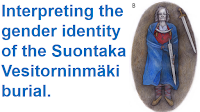A sword known as the 'Excalibur of Valencia', which was discovered by archaeologists in the Seu District of the city in 1994 has been dated to the 10th century, according to a press release issued by the Archeaology Service of the City Council of Valencia on 22 April 2024. The sword was found in an upright position (similar to the way in which the legendary sword of King Arthur of England is commonly depicted, giving it its name) within a refuse pit within the grounds of an Islamic-era house in the Calle del Historiador Chabàs area. However, the style of the sword, which is 46 cm long and curves towards the tip, is typical if the earlier Visigoth Kingdom, which fell to Islamic invaders in 711 AD.
Now a metallurgical study of the sword has dated it to the tenth century, the same period as the dwelling it was associated with, when Valencia was called Balansiya, and formed part of the Andalusian Caliphate. Islamic era swords are extremely rare in Spain, and finding one in Valencia, where the soils tend to be unfavourable for the preservation of iron, is particularly significant. The style of the sword implies a degree of cultural continuity from the Visigoth period, which is often presumed not to have had a major influence on the succeeding Islamic Period.
See also...

.jpg)







%20(1).png)